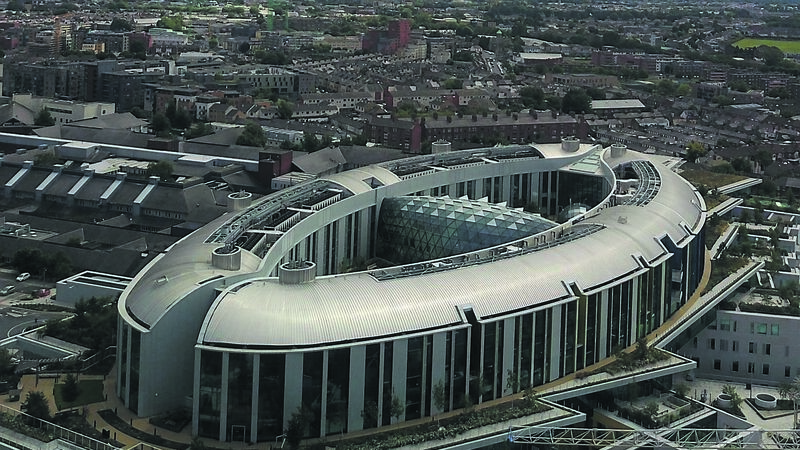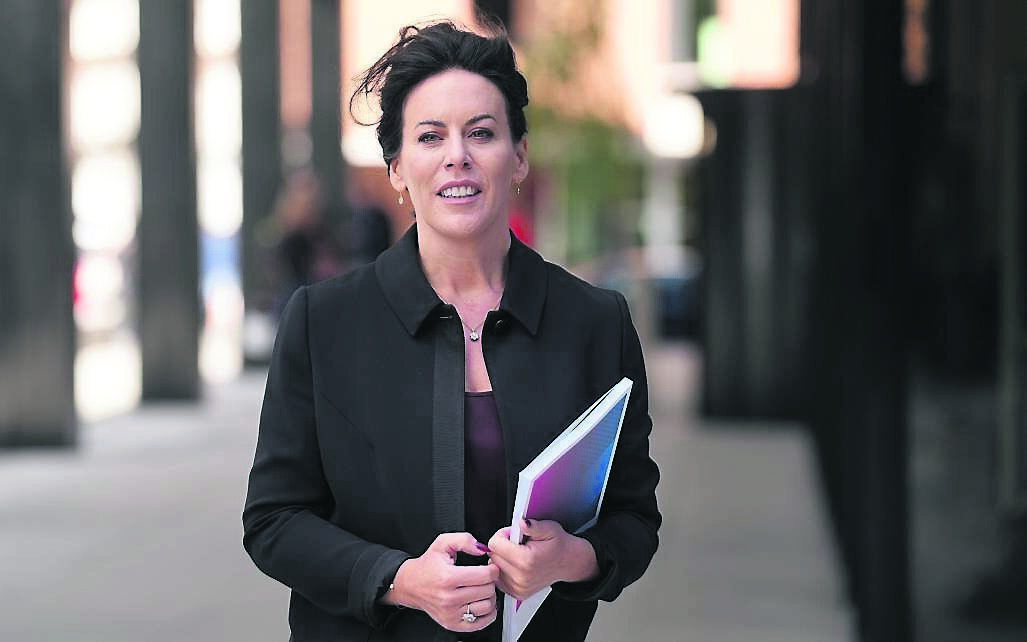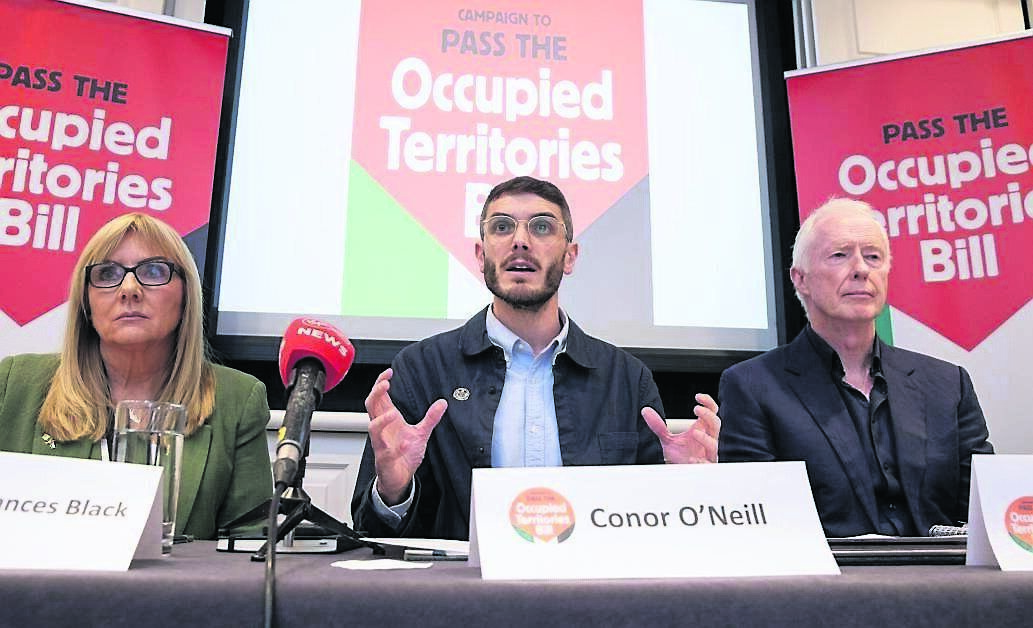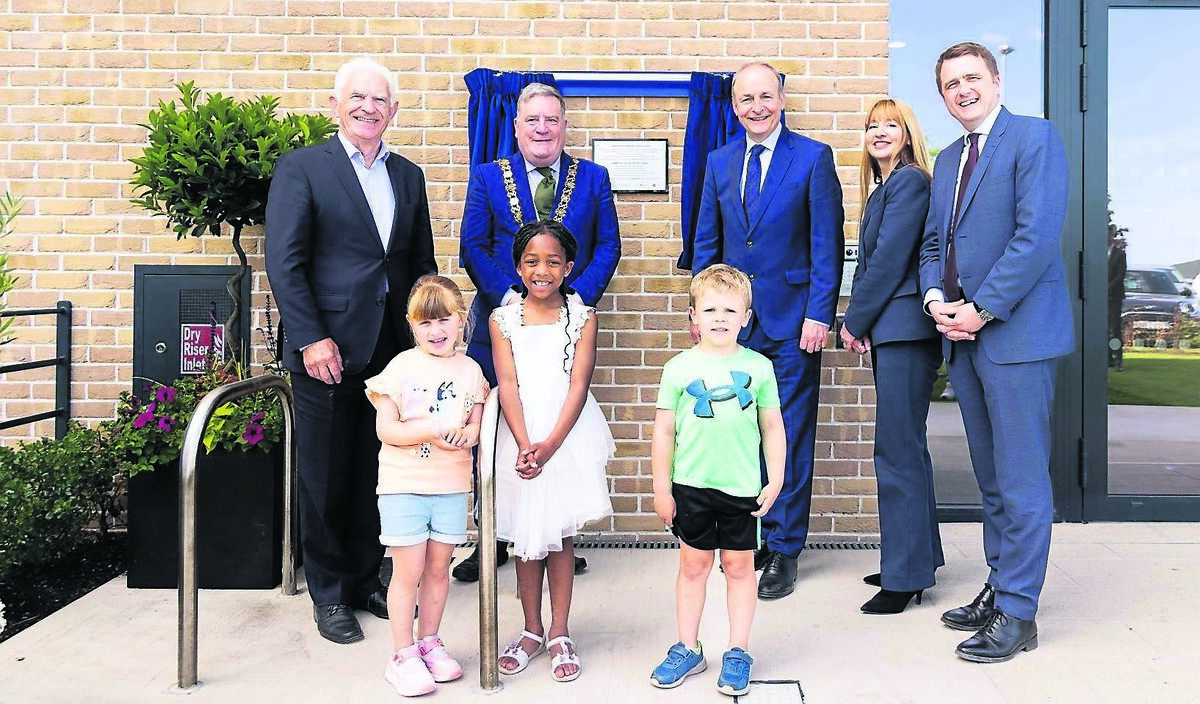What can we expect to dominate the political agenda this autumn?

The National Children's Hospital on the ground of St. James' Hospital, Rialto. Pic Stephen Collins/Collins Photos
Since the 2008 crash, we’ve added descriptors to the budget each year to sum up its major themes: Austerity budgets, recovery budgets, cost-of-living budgets.
This year, it’s going to be the ‘uncertainty budget’.
Since his re-election, last November, Mr Trump has thrown the world economy in to turmoil.
Official Ireland constantly boasts of its strengths as a small, open economy, but at times like this that puts us at major risk.
Over the last few years, the Department of Finance has had to grapple with major economic events, like the stimulus during the pandemic and the ensuing inflation, all the while trying to keep a handle on living costs.
Mr Trump’s erratic and capricious approach to economics has made things incredibly unpredictable. While we can see shadows, the actual threats are unclear and, so too, is the correct way to prepare and respond.
There is some hope that the worst is over, following a deal for 15% tariffs on EU imports into the US. Many will have breathed an additional sigh of relief when threats of 250% tariffs on pharmaceutical imports abated and were brought in to the 15% rate.
However, the real impact of those tariffs is uncertain, and no one can be sure what is to follow.
The only real choice for the Department of Finance is to proceed with caution when it comes to Budget 2026.
The summer economic statement sets out the fiscal space available to the Government as it begins preparing the budget, and this year finance minister Paschal Donohoe and public expenditure and reform minister Jack Chambers laid out the possibility of €1.5bn in tax cuts and €7.5bn in additional spending.
University College Cork economist and chair of the Irish Fiscal Advisory Council, Séamus Coffey, has warned the Oireachtas that recent budgets have pumped money in to an economy that is performing well and the Government needs to balance investment going forward to avoid inflation and boom-and-bust economics.
Mr Coffey said: “If the Government wants to spend more in a certain area, or tax less in another, it needs to offset that by doing less in other areas. This means showing restraint when the economy is strong and being more generous when the economy is struggling.”
In other words, don’t lean in to inflation and put more money into people’s pockets that will only bid up already rising prices.
While there will likely be modest increases in social welfare payments and the budget will keep commitments already made to improve various services, the kite flying this year has been more about what the Government won’t do than what it will.
Mr Chambers has already ruled out another cost-of-living package, like the energy credits of previous years. Housing minister James Browne has poured cold water on an increase to the renter’s tax credit, too.
One of the major commitments that may come to pass is a permanent drop of Vat on food hospitality, from 13.5% down to 9%, which could eat up about half of the space available for tax cuts.
Mr Martin has said that this budget is likely to lean more towards infrastructure than pumping money in to the economy through personal tax or payments.
“We have to be cautious and careful, in terms of the resources that we have,” Mr Martin said. “And I know everybody wants us to spend billions, but that is not open to us. There won’t be any austerity in itself, but there has to be some degree of caution, because the situation could change.”
While the Irish health system is in a pretty constant state of crisis, there’s no other issue right now at the same scale as the National Children’s Hospital, which may or may not open next summer.
The debacle has been an albatross around the neck of a long line of health ministers, and the latest bearer of the burden is Jennifer Carroll MacNeill.
Planning on the project began in 2005 and, following years of often heated debate, developers Bam broke ground on the site in 2016. The hospital was scheduled to be completed by 2022, at a cost of €650m.
Following a series of delays and controversies, the hospital is expected to be open next year, with a final bill closer to €2.24bn.
As costs spiralled and the development was delayed several times, the Government and the developers have been beset by controversies around the cost and timeline. Various factors have been blamed, from changes to the design to the impact of the pandemic and inflation.
With the July 2026 opening now in question, Ms Carroll MacNeill has strayed from her more muted predecessors and engaged in direct public confrontation with the developers.
Based on the current timeline, completed sections of the hospital are supposed to be available to the health service to begin kitting them out, but the deadlines have been missed.

According to Bam, the hospital is more than 99% complete, but has been hamstrung by additional change requests in recent months. The health minister has countered that Bam has had fewer workers on site and hasn’t been drawing down its available funds. She added that the rooms that have been made available are checkered around the incomplete hospital, instead of being in completed zones, thus hampering efforts to prepare them.
The issue is likely to dominate the minister’s agenda in the months ahead, but that’s just part of the problem.
Another slip in the opening date might allow Ms Carroll MacNeill to resolve the matter of governance, following a series of controversies at Children’s Health Ireland (CHI) earlier this year.
CHI was founded in 2018 to govern the new hospital as an amalgamation of the three existing children’s hospitals in Dublin, but the chairperson and four board members resigned earlier this year, following the publication of a HIQA report in to spinal operations.
The damning report was commissioned when it was discovered that three children were given unapproved spring implants to treat their scoliosis at Temple St Children’s Hospital.
It stated that the CHI’s governance structures were too complex and opaque, leaving major burdens on clinical directors and senior managers to resolve issues, but with no clear structure. In many cases, there were major deficits around procurement, with no committee to approve devices like the implants in question.
That followed a previous KPMG report, which questioned the readiness of the CHI to commission and operate the new hospital.
And then, earlier this summer, another report emerged which found that two hospitals had carried out unnecessary hip surgeries on children.
At this point, it’s hard to tell if the opening date for the new children’s hospital is rapidly approaching or moving further away, but, either way, the issue of governance is far from resolved.
This is not a simple process, with the potential for major clashes in culture, personality, and operations between the existing hospitals and the people involved, all while trying to create something new.
Over the coming months, Ms Carroll McNeill will be under serious pressure to get this right, while also hoping she can finally open the doors to the new hospital, and with it a new era for children’s care in Ireland.
Depending on your perspective, Ireland has either diluted its neutrality in recent years or adapted it to suit the turmoil of the modern world.
For a long time, Ireland maintained its version of neutrality from a comfortable position of little influence or importance on the edge of Europe.
But world events have brought strife directly to our doorstep.
On one side, the West has been circling the wagons in the face of direct conflict with Russia, and Ireland is neither in nor out. At the same time, a difference in stance on Israel and Palestine has raised questions about how compatible Ireland’s foreign policy is with our closest allies’ in Europe and the US.
Trying to square this circle has been a major challenge for the Government since the last election, and the next few months will be full of crucial junctures to navigate.
Until recent years, Ireland has mostly been able to keep out of global conflicts, while operating at the periphery of the western military and security alliance.
However, recent events, like the HSE cyber-attack, nixed plans for Russian military exercises in Irish waters, and the impact of the Russia-Ukraine war has brought things right to our doorstep.
While Ireland has been drifting for a long time towards closer integration with Nato and Europe-wide collaboration, those events have brought our security and military arrangements under a microscope, both at home and abroad.
Last month, at Béal na Bláth, health minister Jennifer Carroll MacNeill reiterated the Government’s stance and called for an end to the triple lock, which prohibits Ireland from taking part in any military action without UN approval.
The argument is that Irish sovereignty is subject to veto by Russia and other members of the UN Security Council.
However, just days later, the US used its veto as leverage to end by 2026 the UN Interim Force in Lebanon (UNIFIL).
Since 1978, Ireland has been a major part of this peacekeeping force on the border of Israel and Lebanon, where thousands of Irish troops have operated out of Camp Shamrock, with 47 of them losing their lives.

While conflict with Russia has pushed Ireland towards its Western neighbours, the Israel-Gaza war has highlighted major differences in foreign policy.
The Irish Government has been among the most critical of Israel in Europe, while facing major pressure from domestic campaigners to do even more.
While there has been some shift in other countries’ stances — the UK, France, and Canada plan to recognise the state of Palestine next month, a step Ireland took last year — Ireland’s stance is still out of line with much of the rest of the EU.
At the core of the current tensions is trade between the EU and Israel, which is governed by the EU-Israel Association Agreement. While Ireland has found allies like Spain, and most recently Sweden and the Netherlands, in seeking a suspension of the agreement, there is still no consensus within the single market beyond an examination earlier this year.
That leaves Ireland facing a solo run with its own legislation to ban trade with occupied territories in Palestine, something the Government has been slow to move on.
Commonly referred to as the Occupied Territories Bill, legislation to restrict trade with Israel was originally introduced by Independent senator Frances Black in 2018, but the Government brought in a narrower version of the legislation earlier this year.
While the EU has exclusive competence over trade between the single market and outside states, the prevailing legal argument in the Oireachtas is that Ireland is compelled to restrict the importation of goods — from occupied territories in Palestine — that were deemed illegal by an International Court of Justice ruling last year.
However, the legislation is controversial, both at home and abroad. Ireland has been criticised by both the US and Israel for considering the measure, and both countries have a major presence here through foreign direct investment and trade. Meanwhile, the Government has been criticised domestically for delaying the legislation and limiting it to just goods and not services.
When the Dáil returns later this month, these issues will be high on the agenda, but it’s very unclear where Ireland will land in terms of its place on the world stage.
In the first seven months of this year, the Department of Housing received 269 housing commencement notices from Cork city, a drop of 92% from the 3,451 filed during the same period last year.
While that’s at the sharp end of the statistics, it’s consistent with the rest of the country, with Co Cork having a 72% drop as part of an 80% drop nationwide.
Late last month, Ireland passed a grim landmark: For the first time, more than 5,000 children registered as homeless.
In May, the average monthly rent reached €2,000 for the first time.
No amount of spin can make the situation look good with figures like these.
As if they needed to, various experts from the construction industry and housing activist circles are warning that the Government is unlikely to reach its goal of 303,000 new homes by 2030.
During the summer, Micheál Martin confirmed that an update to the Government’s 2021 Housing For All strategy would be delayed. He cited the need to first update the National Development Plan, which was completed in August.
In the absence of this new strategy, housing minister James Browne, who took over from Darragh O’Brien following the election, has been pushing through some of the Government’s bigger plans, but they have yet to bear fruit.
Much of the focus has been on eliminating red tape and blockers for development.

Prior to his appointment, the Government completed the Planning and Development Act, the biggest update to planning policy in decades and one of the largest pieces of legislation in the history of the State.
It’s promised that the new framework will streamline the planning process, which, at present, can add years and untold costs to major developments.
Mr Browne also introduced new measures for renting, extending rent-pressure-zone protection for tenants nationwide, but exempting new-build apartments from annual 2% caps on rent increases.
On paper, that protects current residents from major increases, while incentivising investment in new builds for international capital, but the impact remains to be seen.
The Government has also directed all local authorities to revise their development plans to rezone more land for housing.
However, that has already led to conflict, with Dublin City Council pushing back earlier this month and saying that enough land has already been zoned to meet the projected demand.
While planning has certainly been a factor in housing delivery, there are also major constraints in essential supporting infrastructure — like roads, sewage, and water — that will need to be resolved, as outlined in the National Development Plan.
The kinds of measures the Government are taking are ones that might require years to bear fruit, but the story was the same in 2016, when the re-elected Fine Gael government said that housing couldn’t be solved overnight, and the same as 2020, when Fianna Fáil entered government promising to turn the tide on housing. In the months ahead, we’ll likely see the launch of a shiny new Housing For All strategy, but the Government will have their work cut out trying to convince the public it will change anything.






 App?
App?


